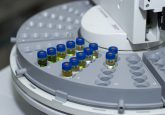4. How important is metabolomics to personalized medicine?

Adam Rosebrock: “I like to use an analogy of biological information flow in that the genome is the catalogue, transcripts and proteins are the paints and brushes that a given cell has chosen to use from that catalogue, and that metabolomics is the painting itself – the product of what the genome, transcriptome, and proteome are making and constantly touching up. Genome sequencing is a fantastic tool for personalized medicine – it tells us changes in the catalogue, but there is a lot of information processing happening between the genome and physiological state.
Given that our goal is personalized medicine, the proximal phenotypes that we measure in metabolomics are fantastic targets for patient diagnosis, prognosis and therapeutic intervention. It is one thing to tell a patient ‘you have a mutation in gene (x) that affects your risk at some future point’ it is quite another to say ‘you have a pathologically relevant accumulation of compound (x) at the moment we drew a sample’. This is a double-edged sword, however, as metabolic state changes dynamically and is far more ephemeral than genomic changes.
Metabolomics has the potential to enable direct measurement of physiological state across more analytes than we can yet count. We know from a long history of experience in genetics that not every mutation is deleterious. In a similar way, not every altered metabolite level can be expected to represent a pathological state. The tricky (and scientifically interesting!) task that constantly faces us is sifting through the incredible amounts of data that we can now generate and separating relatively uninformative compounds from relevant biomarkers and interventional targets.”
Dajana Vuckovic: “Metabolomics is a key enabling technology for personalized medicine because the metabolome is the most representative readout of the phenotype.”
Ian Wilson: “Currently, in my opinion, it is not yet that important. If you ask instead how important could metabolic phenotyping be to personalized medicine? I would say that it is absolutely key to its future.”
Fengguo Xu: “Metabolomics focuses on the endogenous small molecules, which act as downstream products of DNA, RNA and protein. These metabolites usually work as a whole (i.e., the metabolome) to represent the organism state. Different individuals or different situations can have an impact on the metabolome. When external stimuli or endogenous pathology occurs, the metabolome always expresses a significant variation that can easily be tested. Metabolomics not only tells you what actually did happen but also tell you what might happen. Thus, metabolomics could be used to predict drug efficacy, adverse events or to diagnose disease, and shows potential in molecular classification of disease.”





